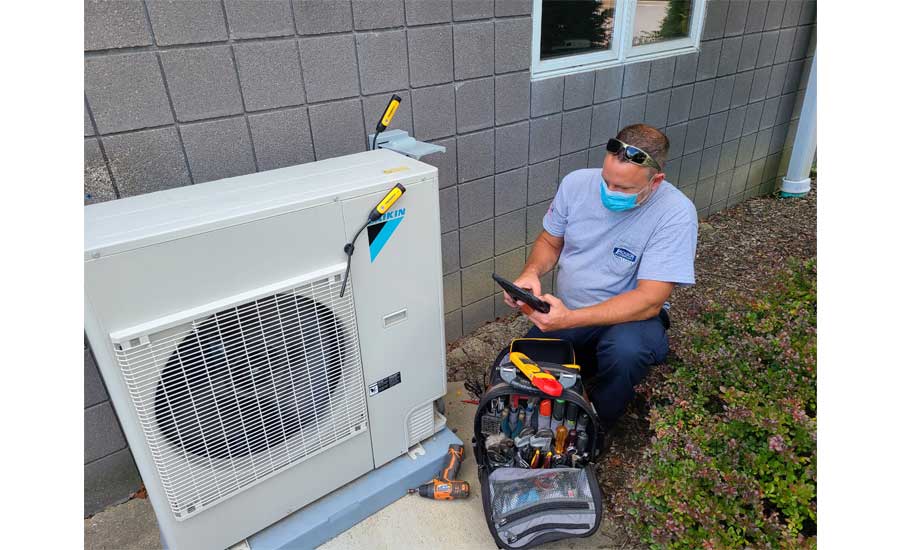How to calculate hvac tonnage

Heating and cooling your home uses a lot of energy and money, so it’s important to choose the right size system. The first step is to calculate the square footage of your home. There are two ways to do this, either by measuring the outside of your home or by using a floor plan. Once you know the square footage, you can multiply it by 30 to get the BTU (British Thermal Units) per hour. This number will tell you how much heat your home needs to generate or how much cooling it needs. Now that you have the BTU number, you need to consider the climate where you live. If you live in a hot climate, you’ll need a unit that can handle more BTUs. If you live in a cold climate, you won’t need as many. Use the chart below to find the climate zone for your area and then look at the column that corresponds to the number of people in your household. Once you have your climate zone and the number of people in your household, you can find your cooling capacity (in tons) or heating capacity (BTUs per hour) using the chart below. Climate Zone Number of People in Household Cooling Capacity (Tons) Heating Capacity (BTUs per hour) 1 2 3 4 5 6 7 8 9 10 After finding your tonnage, you can round up to the nearest half-ton. For example, if you have a 3-ton unit, you can round up to a 3.5-ton unit. If you have a 5-ton unit, you can round down to a 4.5-ton unit. Now that you know how to calculate the size of the HVAC unit you need, you can be sure to get the most efficient system for your home.
How to calculate HVAC tonnage
Most people don’t know how to calculate HVAC tonnage, which is perfectly understandable. It’s not something that comes up in everyday conversation! However, learning how to calculate tonnage can be helpful when you’re trying to determine the size of the air conditioner unit you need for your home. The term “ton” is short for “ton of refrigeration.” A ton of refrigeration is equivalent to the cooling capacity of one ton (2,000 pounds) of ice melting in a 24-hour period. So, when you’re trying to calculate the size of an air conditioner unit in tons, what you’re really doing is figuring out how much heat the unit can remove from the air in an hour. There are a few different ways to calculate HVAC tonnage, but the simplest method is to use a rule of thumb. According to this rule, you should size your air conditioner unit at 1 ton for every 600 square feet of living space. So, if you have a 2,000 square foot home, you would need a 3-ton air conditioner unit. Keep in mind that this is just a general guideline. The actual size of the unit you need may be different, depending on factors such as the climate you live in, the amount of insulation in your home, and the number of people who live there. When in doubt, it’s always best to consult with a qualified HVAC professional.
How to Size an Air Conditioner
Most people don’t know how to size an air conditioner, which is why so many homes have units that are too small or too large. An air conditioner that is too small will run constantly and never really cool your home, while an air conditioner that is too large will cool your home too quickly and then shut off, leaving your home feeling damp and humid. To find the right size air conditioner for your home, you’ll need to measure the square footage of the space you want to cool. Once you have the square footage, multiply it by 25 BTU (British thermal units). This number will give you a general idea of the size air conditioner you need. If you live in a particularly hot climate or your home is very sunny, you may need to increase the BTU rating by 10-20%. Conversely, if you live in a cooler climate or your home is shaded, you may be able to reduce the BTU rating by 10-20%. Once you have the right size air conditioner, you’ll also need to make sure it’s properly installed. If your air conditioner is too big or too small for the space, it won’t work properly and could end up damaging your home.
How to Measure the Tonnage of an Air Conditioning Unit
An air conditioning unit’s tonnage is a measurement of how much heat it can remove from a home in an hour. The higher the tonnage, the more heat the unit can remove. To find the tonnage of your air conditioner, you’ll need to know the unit’s cooling capacity in British thermal units (BTUs) per hour. To convert BTUs per hour to tons, divide the BTU rating by 12,000. This will give you the number of tons your air conditioner can cool in an hour. For example, if your unit has a cooling capacity of 36,000 BTUs per hour, it has a tonnage of 3 tons. Once you know the tonnage of your air conditioner, you can choose the right sized unit for your home. Keep in mind that a larger unit is not always better. A unit that is too large for your home will cycle on and off more frequently, which can shorten its lifespan and lead to higher energy bills.
How to Select the Right Size Air Conditioner
for Your Home When it comes to air conditioners, size does matter. An air conditioner that’s too small for the space it’s cooling will have to work overtime to achieve the desired temperature, resulting in higher energy bills and shorter lifespan. Conversely, an air conditioner that’s too large for the space will cool the room quickly but won’t remove enough humidity, making the room feel clammy. To find the right size air conditioner for your home, start by measuring the square footage of the space you need to cool. Once you have that number, consult an air conditioner sizing chart like this one from Energy Star. For a basic idea of what size air conditioner you need, Energy Star recommends using the following formula: Square footage of cooled space x 35 BTUs = Required cooling capacity For example, if you need to cool a 400 square foot space, you would need an air conditioner with a cooling capacity of 1400 BTUs (400 x 35 = 1400). Of course, there are other factors to consider when selecting an air conditioner, such as the climate you live in and the number of people and/or pets in the space. For a more detailed sizing analysis, consult a qualified HVAC contractor.
How to Determine the Needed Capacity for an Air Conditioner
Size and capacity are two different things when it comes to air conditioners. Just because an air conditioner is big, doesn’t mean it has a high capacity. In fact, most people believe that a bigger AC unit means more power and better cooling efficiency, but this isn’t always the case. So, how do you know what size and capacity air conditioner you need for your home? We’ve got the answer. When it comes to air conditioners, size does matter. But it’s not the only factor you should consider when choosing an AC unit. The size of your room, the layout of your home, the climate you live in, and your personal cooling preferences all play a role in determining the best size and capacity for your air conditioner. To figure out what size air conditioner you need, start by taking measurements of the room or area you want to cool. Once you have the square footage, check the chart below to find out how many BTUs (British thermal units) of cooling power you’ll need to maintain a comfortable temperature. square footage of room/area to be cooled x number of BTUs needed per square footage For example, if you have a 500-square-foot room that you want to keep cool, you’ll need an air conditioner with at least 25,000 BTUs of cooling power. 500 x 50 = 25,000 BTUs Remember, this is just a general guide. The specific number of BTUs you need will also depend on factors like the ceiling height of your room, the level of insulation in your home, the number of windows and doors in the room, and whether the room is sunny or shady. Once you know how many BTUs of cooling power you need, the next step is to choose an air conditioner with the right capacity. The capacity of an air conditioner is measured in tons, and it refers to the amount of heat the AC unit can remove from your home in an hour. One ton of cooling capacity is equivalent to 12,000 BTUs. So, if you need an air conditioner with 25,000 BTUs of cooling power, you’ll need a unit with a capacity of at least 2 tons. 2 tons = 24,000 BTUs Keep in mind that the capacity of an air conditioner doesn’t necessarily indicate how powerful the unit is. A 2-ton air conditioner with a higher capacity can actually be less powerful than a 1-ton air conditioner with a lower capacity. The reason for this is that the capacity of an air conditioner refers to its ability to cool, not its actual power. Now that you know how to determine the size and capacity of air conditioner you need, the next step is to choose a unit that’s the right fit for your home. If you need help selecting an AC unit, contact a local HVAC contractor. They can help you find an air conditioner that’s the right size and capacity for your home and your cooling needs.
How to Maximize the Efficiency of an Air Conditioner
Assuming you would like an article discussing how to increase the efficiency of an air conditioner: As the weather gets warmer, many people begin to rely on their air conditioners to stay cool. However, running an air conditioner can be costly, so it is important to make sure that it is as efficient as possible. Luckily, there are several things that you can do to ensure that your air conditioner is running at its highest efficiency. One of the most important things that you can do to increase the efficiency of your air conditioner is to make sure that the unit is the correct size for the space that it is cooling. An air conditioner that is too large for a space will not only be less effective, but will also use more energy. In order to find the perfect size air conditioner for your needs, consult with a professional. Another way to increase the efficiency of your air conditioner is to regularly clean or replace the filter. A dirty filter will make the unit work harder, which uses more energy and can cause premature wear and tear. Check the manufacturer’s recommendations to see how often the filter should be replaced or cleaned. In addition, it is important to keep the area around the air conditioner clear. If the unit is blocked by furniture or other objects, it will have to work harder to cool the space, which wastes energy. Finally, make sure to schedule regular maintenance checks for your air conditioner. A professional can clean the unit and check for any potential problems. Catching problems early can prevent them from becoming bigger, more expensive issues down the line. By following these tips, you can keep your air conditioner running efficiently all summer long.



